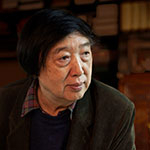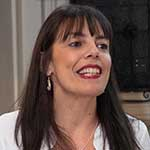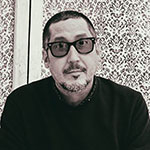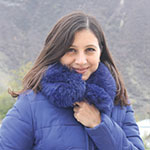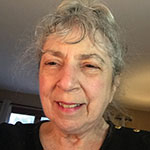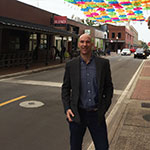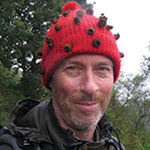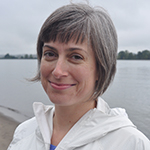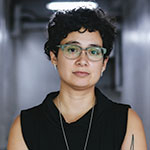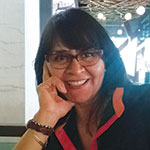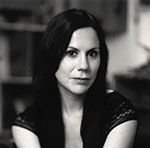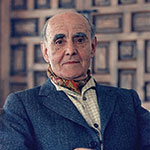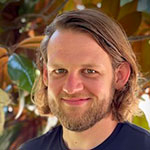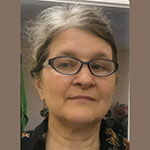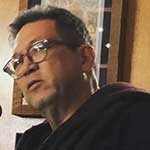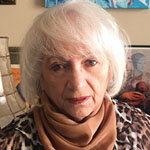Authors
Find your favorite authors featured in WLT or browse the entire list.
John Felstiner
John Felstiner (b. 1936) recently retired after teaching at Stanford for forty-nine years. His major books include Translating Neruda: The Way to Macchu Picchu; Paul Celan: Poet, Survivor, Jew; Selected Poems and Prose of Paul Celan; Can Poetry Save the Earth? A Field Guide to Nature Poems; and Jewish American Literature.
Feng Jicai
Feng Jicai (b. 1942) is a contemporary Chinese writer, painter, and cultural scholar. He was also a professor at Tianjin University. Feng started publishing literary works in 1977. His most important works include Shenbian (1984; The wonder queue), which won the National Outstanding Novella Prize; the short story “Shitou Shuohua” (1998; The stone talks), which won China’s October Literature Prize; and the short-story collection Sushi Qiren (2018; Rarities in the secular world), which won the Lu Xun Literary Prize.
Enrica Maria Ferrara
Enrica Maria Ferrara is a writer, translator, and scholar in Italian literature and film working at Trinity College Dublin. Recent publications include Posthumanism in Italian Literature and Film: Boundaries and Identity (Palgrave, 2020), of which she is the editor, and Reading Domenico Starnone, a special issue of Reading in Translation (co-edited with Stiliana Milkova, 2021).
César Ferreira
César Ferreira is a professor of Spanish at the University of Wisconsin–Milwaukee, where he teaches contemporary Latin American literature.
Jorge Ferrer
Havana-born Jorge Ferrer is a writer, editor, and award-winning translator. Among the authors he has translated into Spanish are Alexandr Herzen, Ivan Bunin, Svetlana Alexievich, Vasily Grossman, Guzel Yakhina, and Vasily Rozanov. In 2012 he received the Boris Yeltsin Foundation’s “Russian Literature in Spain” prize. He lives in Barcelona.
Feyziyye
Feyziyye was born in 1982. She works as a newspaper journalist in Baku. She has published one book of poetry, Message. Her poetry takes up themes of war and displacement.
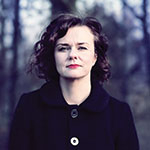
Photo by Radek Kobietskidiv>Julia Fiedorczuk
Julia Fiedorczuk (b. 1975) is a Polish poet, prose writer, translator, and lecturer in American literature at the University of Warsaw. She has published five books of poetry, a collection of short stories, and two novels. Her Pushcart-nominated poem “Lands and Oceans” appeared in the November 2014 issue of WLT. Her most recent book, Nieważkość, was nominated for the Nike Prize. Oxygen, a volume of selected poetry translated by Bill Johnston, is forthcoming from Zephyr Press in 2017.
Elizabeth Fifer
Elizabeth Fifer is a professor of English (emerita) at Lehigh University. She writes on contemporary world literature.
Marilyse Figueroa
A recent graduate of the University of Oklahoma and former WLT intern, Marilyse Figueroa now lives in and writes from San Antonio, Texas.
Vera Filenko
Vera Filenko writes feature scripts, prose, and poetry in Russian and English. Her prose has been published in Belarusian and Russian independent media and literature almanacs (Snob, Makulatura, AST). She received a grant from the Union of Belarus Writers for publishing her shorty-story collection Transfer Me (2018).
Gary Fincke
Gary Fincke’s newest collection, The Infinity Room, won the Wheelbarrow Books Prize for Established Poets (Michigan State, 2019). Earlier collections have been published by Arkansas, Ohio State (2003, OSU/The Journal Prize), BkMk, Zoland, Stephen F. Austin (2011, SFA Prize), and Jacar (2015 Book Prize). Other book-length work has won the Flannery O’Connor Prize for Short Fiction, the Robert C. Jones Prize, and the Elixir Press Fiction Prize.
Jonathan Fink
Jonathan Fink (jonathanfink.com) is professor and director of Creative Writing at the University of West Florida. He has published two books of poetry: The Crossing (Dzanc, 2015) and Barbarossa: The German Invasion of the Soviet Union and the Siege of Leningrad (Dzanc, 2016). His poems and essays have appeared in the New York Times Magazine, Poetry, New England Review, TriQuarterly, Southern Review, Virginia Quarterly Review, Slate, and Witness, among other journals.
Nancy Finn
Nancy Finn teaches dramatic literature and Irish studies in the English Department at the University of Massachusetts Boston, and theater studies in the Performing Arts Department at Emerson College. She received her PhD in theater from the University of California at Santa Barbara. Her research interests include modern and contemporary Irish theater and drama, contemporary women playwrights, and theater historiography. She is also an actor and dramaturge. She is currently writing a monograph on the work of Marina Carr.
Peppe Fiore
A native of Naples, Peppe Fiore lives and works in Rome. In addition to Nessuno è indispensabile, he is the author of two short-story collections and a second novel, La futura classe dirigente (The future ruling class). His interest in writing about the world of work, he says, is tied to the way “working life becomes a useful framework for understanding how we function as a species.”
Will Firth
Will Firth (www.willfirth.de) was born in 1965 in Newcastle, Australia. He studied German and Slavic languages in Canberra, Zagreb, and Moscow. Since 1991 he has lived in Berlin, where he works as a translator of literature and the humanities (from Russian, Macedonian, and all variants of Serbo-Croat). His best-received translations of recent years have been Robert Perišić‘s Our Man in Iraq, Andrej Nikolaidis’s Till Kingdom Come, and Faruk Šehić’s Quiet Flows the Una.
Anne O. Fisher
Anne O. Fisher’s latest translation is Ksenia Buksha’s novel The Freedom Factory (2018), published by Phoneme Media. With poet Derek Mong, Fisher co-translated The Joyous Science: Selected Poems of Maxim Amelin, winner of the 2018 Cliff Becker Book Prize in Translation (four of Amelin’s poems appeared in the September 2017 issue of WLT). With bilingual writer Margarita Meklina, Fisher co-edited the folio Life Stories, Death Sentences: Contemporary Russian-Language LGBTQ+ Writing, forthcoming in In Translation in conjunction with Pride Month 2019.
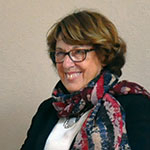
Photo: S. Mistraldiv>Pierrette Fleutiaux
Pierrette Fleutiaux’s (b. 1941) 1984 collection, Les Métamorphoses de la reine, won the Prix Goncourt for short stories. The first story from this collection, “The Ogre’s Wife,” was selected for inclusion in The Year’s Best Fantasy and Horror 1992 and also adapted into an opera. In 1990 Fleutiaux won the Prix Femina for her novel We Are Eternal (trans. Jeremy Leggatt).
Irina Flige
Irina Flige has been the director of the Research and Information Center “Memorial” St. Petersburg since 2002. A social anthropologist specializing in the material memory of Soviet state terror and the Gulag, she has been collecting and preserving personal archives for many years. She is also a widely published expert on Gulag burial sites. Visit worldlit.org to read Emily Johnson’s interview with Flige.
Leonora Flis
Slovene author Leonora Flis wrote Upogib Časa (Bending time), a book of essays about living in New York City as a foreigner after spending a Fulbright year in the city studying at Columbia. She teaches narrative nonfiction in Ljubljana and Nova Gorica.
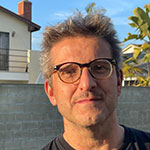
Photo by Dena Florczykdiv>Piotr Florczyk
Piotr Florczyk is an award-winning poet, translator, and scholar who teaches in the Global Literary Studies program at the University of Washington, Seattle. Alongside multiple volumes of Polish poetry translations, he has published books of original poetry in English and in Polish. He lives with his family in Los Angeles.
Laurel Flores Fantauzzo
Laurel Flores Fantauzzo is the author of the nonfiction book The First Impulse, which examines a love story and mystery in Metro Manila. She was a 2016 finalist for the PEN/Fusion Award, and she has earned grants and residencies from Erasmus, Hedgebrook, Fulbright, and the Astraea Lesbian Foundation for Justice.
Dolores Flores-Silva
Dolores Flores-Silva, from the Mexican Gulf state of Veracruz, teaches Latin American literature and culture at Roanoke College. She is co-author of The Cross and the Sword in the Works of Rosario Ferré and Mayra Montero (2009) and has written on topics such as Mexican and Hispano-Caribbean literatures and cultures, Chicano Studies, and—most recently—the US South. Her publications as a poet, playwright, and translator traverse languages and borders.
Jennifer Elise Foerster
Jennifer Elise Foerster is an alumna of the Institute of American Indian Arts and the Vermont College of the Fine Arts. A Muscogee (Creek) Nation citizen, she is pursuing her PhD at the University of Denver. Her first book of poems, Leaving Tulsa, was published by the University of Arizona Press in 2013.
J. V. Foix
J. V. Foix (1893–1987) was a Catalan poet and essayist; this photo was taken in Cadaqués, Girona, in 1969. At the start of the twentieth century, he was instrumental in introducing the European avant-garde movements into Catalonia. “The Village” is an extract from his collection of prose poems, Daybook 1918.
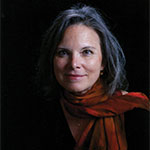
Photo: Don J. Usnerdiv>Carolyn Forché
Carolyn Forché’s first volume, Gathering the Tribes, winner of the Yale Series of Younger Poets Prize, was followed by The Country Between Us, The Angel of History, and Blue Hour. Her latest collection, In the Lateness of the World, is forthcoming in 2017. She has translated Mahmoud Darwish, Claribel Alegría, and Robert Desnos. Her famed international anthology, Against Forgetting: Twentieth-Century Poetry of Witness (1993), has been praised by Nelson Mandela as “itself a blow against tyranny, against prejudice, against injustice,” and was followed by the anthology Poetry of Witness: The Tradition in English, 1500–2001 (2014). In 1998 she received the Edita & Ira Morris Hiroshima Foundation for Peace & Culture Award in Stockholm for her human rights advocacy and the preservation of memory and culture. She was also a finalist for the 2016 Neustadt International Prize for Literature. She holds a University Professorship at Georgetown University, where she directs the Lannan Center for Poetics and Social Practice. She is currently at work on a memoir and a fifth collection of poetry.
J. Rhett Forman
J. Rhett Forman’s (@drjrforman) scholarly and creative work has appeared in Midwest Quarterly, The Round, Agave, Brief Wilderness, Borderlands, Literature of the Americas, Contemporary Studies in Modernism, and anthologies by Clemson University Press. He holds a lectureship at Tarleton State University and received a BA from St. John’s College and PhDs from the University of Dallas and the University of Salamanca.
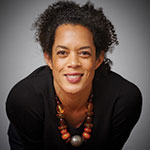
Photo: Johnathan Ringdiv>Aminatta Forna
Aminatta Forna (OBE) is a prizewinning novelist, memoirist, and essayist. She is currently Lannan Visiting Chair of Poetics at Georgetown University and professor of creative writing at Bath Spa University. Her latest novel, Happiness (Grove), will be published in March 2018.
Sibelan Forrester
Sibelan Forrester teaches Russian language and literature at Swarthmore College in Pennsylvania. She has published translations of fiction, poetry, and scholarly prose from Croatian, Russian, Serbian, and Ukrainian.
Sesshu Foster
Sesshu Foster has taught composition and literature in East LA for thirty-five years. His most recent book, City of the Future, won a 2019 CLMP Firecracker Award. He is collaborating with artist Arturo Romo on the novel ELADATL, to be published by City Lights Books in fall 2019.
Anna Frajlich
Anna Frajlich is an award-winning Polish poet and writer. Her work includes eighteen books of poetry, some of which have been translated into English, French, Italian, Ukrainian, and Spanish. For over thirty years she taught Polish language and literature at Columbia University.
Pagination
